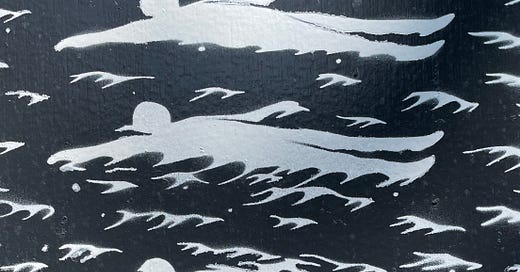I was sceptical when I first heard about Shared Assets. As Mark said in his last post, it was 2012, austerity was just kicking in, the Olympics had finally come to town, and I was deep in one of the worst years of my life, personally speaking. Ben Metz, who co-founded Shared Assets with Mark had talked to me (in the Railway Tavern in Dalston!) about this cool new project he and Mark were starting that was focussing on community land management rather than ownership and that I should look out for a job that would be advertised soon.
I was sceptical about the premise - by that stage in my career I was a fully paid up member of the “community ownership is the solution” crowd, to the extent that Mark and I had been on opposing sides of a debate on ownership vs management at that year’s Oxford Jam.
I was sceptical because of the personal timing - it had been a year of death and grief for many of my close friends, and my own mum was seriously ill. I had just applied to the Clore Social Leadership Fellowship, and I had a full time job with proper security and benefits.
But I was mainly sceptical - and worried - about the risk of joining a bloke with a big idea. Basically every job I had had in the social sector had been in small-ish organisations with the founders still in charge. I’d learned a lot from all of them, and am grateful for their experience and wisdom, and their belief in me. However I knew first hand that often the self-belief that enables people to think that their idea is one that should prevail often then means they are less than good managers. The drive, passion and (let’s be honest) ego that means that people can achieve supposedly impossible things also often creates a gravity well of unhealthy power dynamics, opaque decision making and processes that are shaped around one person’s personality. I was getting to be very done with that kind of environment.
But when I saw the job ad, it was, on paper at least, something I was extremely well qualified for. That doesn’t happen a lot when you’ve accidentally built a 10-year career doing something as niche as “helping people do community assets projects”. And there was a lovely line in the ad that said something like “what we can’t offer in security we can make up for with a sense of adventure”. Given the year I was having it suddenly felt like a bit of adventure might be just what I needed.
So, I applied, got offered an interview and went in, still sceptical. I left the interview completely convinced that I wanted the job. What had shifted was partly that I asked questions that reassured me that Mark wasn’t the kind of “bloke with an idea” that I had been worried about, that he genuinely wanted a partner. But there was also something more intangible, the idea of being in at the beginning of something, of being able to shape what it actually felt like to be inside an organisation that unexpectedly began to tug at my imagination.
I’d never particularly wanted to set something up before - and I didn’t set up Shared Assets. But that interview unlocked a sliver of ambition that I didn’t know I’d had - an ambition to build a thing that could be actually good for what it was, not just what it achieved.
I got the job (obvs), and soon enough joined Mark in what must have been the smallest office in Oxford House (so small that when we started interviewing our first (paid!) interns we had to be careful not to brush knees with them).
In many ways that first couple of years is a real blur in my memory. My mum had died in between the interview and starting the job. I was really grateful for the work and the momentum and excitement of building something new, but that period will always be imbued with grief for me, and I’m sure there were times when I was not quite thinking clearly or, erm, operating at peak productivity.
Maybe partly because of that, though, the need to build a human-focussed organisation felt really acute. We realised early on that we were both very interested in the “how” of the organisation, in what a “Shared Assets” way of doing things would be. A lot of it developed quite organically (again, processes being shaped by the personalities of the people in at the beginning), and we made some clear decisions that were informed more by values than by the bottom line early on, like always paying interns and not using volunteers. We paid a lot of attention to how we recruited (and I still stand by our “top tips for applications!”). We talked in lots of metaphors about who or what “Shared Assets” was (a vehicle, a flaky friend, a platform).
One day I realised I was talking on behalf of the organisation and that I really felt like I was channeling it. I knew what Shared Assets wanted, and how it would do things, and what it didn’t want or wouldn’t do. That had never happened to me before in previous roles, and both Mark and I became very personally identified with and entwined with Shared Assets the organisation.

I became an executive director in 2016. At the time it felt like quite an obvious thing, more of a formality - I’d always gone to all the board meetings and Mark and I did make decisions together. Looking back, though, I wonder if it did change things, whether having that formally mandated power (and shared responsibility) in the company did shift my relationship to it. There’s an undoubted external impact - being able to say you’re a director of something definitely gives you clout to speak on its behalf to other people in a way that being employed doesn’t.
Ironically though, it was pretty soon after this that I started reflecting on and trying to disentangle my personality from the organisation. At our 5th birthday party in 2017, lots of people talked about Shared Assets being “Mark and Kate” - and we realised around then we had created an accidental “mum and dad” dynamic. We hadn’t replicated a lot of the more toxic traits we’d been trying to avoid but we had built an organisational personality that was very reflective of our own. Maybe at that stage we had both become “blokes with an idea”.
Over the next five years we worked on building a self-managing culture with more distributed leadership across the team through different experiments. That experimentation and change has ramped up since I left the team almost two years ago.
There’s a lot of talk about the responsibility of being a company director, and rightly so. But as we explored previously, the risks are actually fairly limited. Something that gets less attention, and something I hope we can explore more here, is the creative joy that can come from taking responsibility for a corporate body. It felt very different from being in a team in a bigger organisation, partly I think as I had more power. I found it hugely enlivening, being able to be one of the people animating this legal construct and being able to make it do things. Being able to bring an idea to fruition is exciting - it is an adventure (as promised!) - and in doing so you create the personality and shape of the corporation you’re bringing to life.
This can all be quite abstract, but when it felt most alive was when we used metaphors to think and talk about Shared Assets, or when we left a seat at the table for the organisation itself. Shared metaphors are one way of making this fairly abstract feeling more tangible for everyone in an organisation.
It would be great to hear what kind of metaphors you use for the places you work - either in the comments below or using our new voicenote feature!







The single most rewarding job I have ever had was helping to build a 100 person company with former colleagues (now friends). Our overarching goal was to build the best place people had ever worked at, and sell some useful software too. It was so satisfying to be able to create that, even just for a few years.